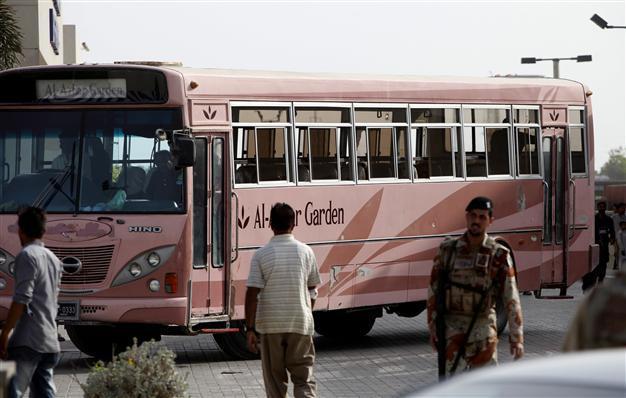ISIL claims deadly attack on Karachi Shiites, first in Pakistan
KARACHI - Agence France-Presse

A Pakistani paramilitary trioop stands guard near a bus targeted by attackers in Karachi, Pakistan, Wednesday, May 13, 2015. AP Photo
Pistol-wielding gunmen in Pakistan's biggest city Karachi stormed a bus carrying members of the Shiite Ismaili minority May 13, killing at least 43 in the first attack in the country officially claimed by the Islamic State of Iraq and the Levant (ISIL).
ISIL claims, posted on Twitter, are set to raise fears over the Middle East-based jihadists' growing influence after they announced in January the creation of a branch in what they called "Khorasan province", encompassing Afghanistan, Pakistan and parts of surrounding countries.
"Thanks be to Allah, 43 apostates were killed and around 30 were wounded in an attack carried out by Islamic State [ISIL] soldiers on a bus transporting Shiite Ismaili infidels in the city of Karachi," the extremist group said in an Arabic statement, citing a higher number of injured than Pakistani officials.
Pakistani police also found leaflets claiming ISIL responsibility at the scene of the attack in the city's eastern Malir district, while the homegrown Jundullah militant faction, which some analysts suspect of having ties to ISIL, made a separate claim of responsibility to AFP.
Pakistan has experienced a rising tide of sectarian violence in recent years, particularly against Shiites, who make up around 20 percent of the country's predominantly Muslim population of 200 million.
"According to the initial information which we have received from hospitals, 43 people have been killed and 13 wounded," Ghulam Haider Jamali, police chief of Sindh province told reporters.
"Six terrorists came on three motorcycles, they entered the bus and began firing indiscriminately. They used 9mm pistols," he said.
Paramilitary Rangers conducted a series of targeted raids in Sohrab Goth and Safoora Goth neighbourhoods after the attack and arrested 18 suspects, the Rangers said in a statement, giving no further details.
Prince Karim Aga Khan, the spiritual leader of the world Ismaili community, confirmed the toll in a statement sent by his office in France.
"This attack represents a senseless act of violence against a peaceful community," the philanthropist and business magnate said.
The killings were also condemned by Prime Minister Nawaz Sharif, who arrived in the city May 13 evening and chaired a high-level meeting involving the country's army chief General Raheel Sharif and other senior officials.
General Sharif, meanwhile, cancelled a pre-scheduled trip to Sri Lanka.
"No effort will be spared to apprehend and punish perpetrators of this terrorist act, their abettors and backers," the army chief said in a telephone conversation with the Ismaili spiritual leader.
UN Secretary-General Ban Ki-moon condemned the attack, but urged Islamabad to "take swift measures aimed at effective protection of religious minorities".
There have been concerns recently about ISIL tapping support in Pakistan, a country awash with dozens of militant groups.
Leaflets backing ISIL jihadists have been seen over recent months in parts of northwest Pakistan and pro-ISIL slogans have appeared on walls in several cities, but Wednesday's claims are the first official ones to be made by the group.
A spokesman for the Jundullah militant faction, which has claimed several major attacks in the past, including one on a church in Peshawar that killed 81 Christians in 2013, also said his group was responsible for storming the bus.
Speaking over the phone from an undisclosed location, Ahmed Marwat said: "Shiites and Ahmadis are unbelievers, they are apostates and deserved death."
Little is known about Jundullah, its strength, or its organisational structure, but it is believed to be based out of the country's tribal areas and parts of Karachi.
According to security analyst Amir Rana, the shadowy group has pledged its allegiance to ISIL in the past.
"Jundullah is the group who at the very initial state had shown its allegiance to Daesh, or Islamic State [ISIL], and it has a lot of inspiration from the group," he said.
"And this was the same group who had claimed that they were going to be setting up an ISIL-style caliphate in the country."
At Karachi's Memon Hospital Institute, where most of the wounded from May 13 attack were rushed, crying relatives formed a human chain outside the main building to keep onlookers away.
A sobbing middle-aged man told AFP: "I have come to collect the body of my young son. He was a student preparing for his first year exams at college."
The bus itself, which had been driven after the attack to the hospital, was drenched in blood and riddled with bullet holes.
One female survivor who asked to remain anonymous described the attackers as being clean-shaven and dressed in Western attire, according to a male nurse who spoke to her.
The passengers were instructed to bow their heads as one attacker shouted "Kill them all", the nurse quoted the survivor as saying.
"One attacker mentioned there were two kids on board and the other told them to let them live," she told the nurse.
May 13 attack was the second-deadliest in Pakistan this year after 62 Shiite Muslims were killed in a suicide bombing in late January.
Karachi, a sprawling city of roughly 20 million, has long had a reputation for high crime rates as well as ethnic, political and sectarian violence.
